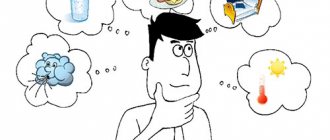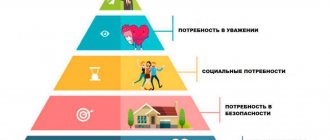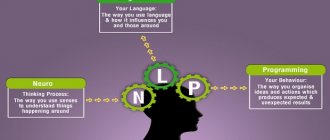Mankind knows many pyramids: the pyramids of Giza, the pyramids of Machu Picchu, the pyramids of Kukulkan and others. They are all phenomenal, each in their own way, and all arouse great interest. But in addition to these unique architectural structures, there are also pyramids of a different kind, which, nevertheless, cause far from weak excitement around them. They can be called intelligent structures. And one of them is the pyramid of needs of Abraham Maslow, a famous American psychologist, the founder of humanistic psychology.
In the online program “Self-Knowledge”, with the help of psychological tests and exercises, you will find out what you really want in life and understand your strengths and weaknesses.
Maslow's theory - in brief
The researcher’s goal was the main incentives and motivators, understanding what is the main driving force and call to action. He expressed the idea that each of us has conditions for a comfortable life, we strive for them and achieve them. Something is more important for us, something is significant, but not paramount. Based on this conclusion, the psychologist built a hierarchy of necessary requirements. It includes physiological needs, safety, the desire to love and be loved, respect, status and self-actualization.
If basic aspirations are not satisfied, it is difficult for people to think about higher matters. When your salary is not enough for daily expenses, you work your butt off and don’t sleep at night to pay off your mortgage, you have no time to think about self-development, and you are unlikely to want to.
The need to satisfy the aesthetic principle
Maslow's clinical observations led him to the conclusion that the need for aesthetic satisfaction is stronger in some people than in others. Deprived of aesthetic pleasures, immersed in a world of ugly things and rude, ill-mannered people, such individuals literally become ill. The best medicine for them is the opportunity to once again come into contact with those values that are internally close to them. It is interesting that aesthetic needs manifest themselves in almost every healthy child.
Evidence of the existence of aesthetic needs can be found in any culture, at any stage of human development, starting from its birth. This type of needs is closely related to cognitive and conative needs and is inseparable from them. Externally, the need for aesthetic satisfaction can manifest itself in a very similar way - in the desire for order, symmetry, completeness, structure, consistency.
In their extreme manifestations, these needs can represent a cause for concern for the psychiatrist, because: “... if we see that a person quite consciously experiences an irresistible desire to correct a picture that, in his opinion, does not hang perfectly straight, then is it possible to interpret this need unambiguously? ? (A. Maslow).”
Authorship
Maslow outlined his thoughts in his treatise “Motivation and Personality,” published in 1954.
It is important that, in his opinion, the order of provision of necessary goods may vary from person to person, which is why he did not draw a diagram or present his concept in the form of a diagram. This was done by his students and followers. According to some sources, the author is F. Kotler, the writer of the handbook for marketers “Fundamentals of Marketing”; according to others, it is W. Stopp, who, five years after the author’s death, published a hierarchy of desires in his articles.
Table
At the heart of Maslow's pyramid are the basic human instincts, which psychology considered to be extremely important needs for a satisfactory standard of living. Surprisingly, the impulses of the soul were not taken into account until the mid-20th century, when an innovative psychologist started talking about them.
| Level | Definition | Brief explanation |
| Physiological | It unites what is naturally connected with human life and sociality. |
|
| Safety | The need to feel security and comfort for yourself and your loved ones. |
|
| Social | Includes communication, affection, family creation, joint activities. |
|
| Prestige and reputation | Reminds you of the desire to be needed and important, to respect yourself and receive recognition from society. |
|
| Cognitive (creative) | Expresses a desire for new knowledge, expansion of erudition and development of intelligence. |
|
| Aesthetic | Helps to achieve harmony and joy through beauty and art. |
|
| Spiritual | The highest level of needs for the harmonious development of personality. |
|
Psychologist Daria Milai
Make an appointment
Need for belonging and love
Having been satiated and protected from possible threats, chaos and instability, it is time for a person, according to Maslow, to think about love and recognition, affection and belonging. “The motivational spiral begins a new round,” in which he realizes how important friends, a loved one, family, and children are. He is looking for warmth and friendship, a family that would need him, a social group of “interests.” Those times when he suffered need and reacted to the word love with an ironic grin are in the past. Being well-fed, financially independent and socially protected, a person realizes his loneliness and is burdened by his rejection, tries to find his roots, friends, and soul mate. It turns out that it is extremely important for a person to realize and feel that he lives with people close and understandable to him, surrounded by “his own people”, and belongs to a certain social group, team, class.
Man’s craving for unity with his own kind has an ancient and deep animal nature, the same herd feeling that our distant ancestors experienced. The severance of family ties, divorces, the growth of mobility of a modern nation, the deepening of the gap between generations, urbanization and technologization of society, the devaluation of traditional values give rise to a vacuum in which a person experiences an urgent need for love and communication. Its dissatisfaction leads to maladaptation, and in the long term – to serious psychological pathologies.
An additional obstacle to the realization of one’s need for love and belonging is the ambivalent attitude towards them in modern society. Sincere and open expression of one's feelings is often not welcomed and is driven into artificial boundaries. This is how a “ban on tenderness” is formed, a distinction between the concepts of love and sexual attraction, sex and affection.
Maslow's pyramid of human needs
The approach associated with the assumption that people need to satisfy not only physiological needs, but also want to develop spiritually and be recognized, became revolutionary in the 40s of the last century. The scientist created a structure in which he highlighted:
- congenital (stages 1 and 2);
- acquired (starting from the second and above).
Further, he divided them into types:
- lower ones (it is necessary to satisfy them, otherwise we will not survive);
- higher ones, it is not so easy to satisfy them.
According to the theory, only 2% of people make it to the top of the pyramid. Its levels look like this:
- Physiology.
- Safety.
- Love and desire to be accepted.
- Respect.
- Cognition.
- Aesthetics (craving for beauty).
- Unlocking personal spiritual potential (self-actualization).
After Maslow’s death, his brainchild began to be used in marketing; it still attracts the attention of theorists and practitioners of psychology and business, causing a lot of controversy and adjustments. Modern approaches include, for example, models for a post-industrial society.
Physiological
Like any other living organism, for normal development, growth and existence, a person requires water, food, and air. He should be able to sleep, recuperate and go to the toilet. As a species, we continue our race and are influenced by hormonal surges.
While your stomach is growling from hunger, and your eyes are drooping from sleepless nights, you won’t be able to concentrate on work, creativity or reading. Maslow includes health, food, sleep, water and other innate needs as the first stage.
Face-to-face consultation
What are the features and advantages of face-to-face consultation?
Find out more
Skype consultation
What are the features and benefits of Skype consultations?
Find out more
Safety
It comes to the fore after providing physiological needs. This concept is multifaceted. It includes:
- physical protection from violence, attacks, wars, natural disasters;
- social stability and confidence in the future, which is determined by the presence of education, good work, pension;
- inviolability of private property, protection and insurance of one’s property;
- freedom from fear, confusion and confusion;
- law and order, clear rules and framework.
A person is designed in such a way that he prefers the known to the unknown, therefore he strives to obtain information and sees this as a guarantee of his security. And everything new takes root in society with difficulty. It’s not for nothing that we often use the expression: “Stability is an indicator of class.” We want to protect ourselves and our loved ones and continue to rise to the top of the pyramid.
Love/Belonging to something
At the new turn of the motivational spiral, love and friendship relationships become relevant. Their shortage is acute and is the most important need.
The feeling of loneliness and rejection torments, causing suffering. We strive to find a kindred spirit, a family in which we will be accepted and loved, like-minded people and friends.
Maslow identified deficiency love, which is addressed to others with the goal of getting something in return: sex, respect, a companion and being love, which is aimed at the inner world, interests and life of another person. She knows how to accept everything as it is, does not try to intervene and change, does not strive to possess the object of passion. So, having grown flowers and admiring their beauty, under the influence of existential love, you will leave them in the flowerbed, and succumbing to scarcity, you will cut them for a bouquet.
Respect
This is all connected with the desire to gain recognition and take an authoritative position in society. The desire for prestige involves people in the struggle for promotion at work, and encourages them to take up dancing, music, and fencing. It craves growth in self-esteem.
When others evaluate and approve of your actions and achievements, you become confident in yourself, get the opportunity to open up and use all your talents.
Cognition
The description of Maslow's 7-level pyramid does not end with this step, although in some versions it is the top. Exploring the world, searching for new paths and opportunities is one of the most powerful incentives for development and the desire to survive. The only way to overcome your anxiety about the future is to begin to control your destiny. Only then will fears turn into new opportunities, and ethereal experiences into real adventures.
I will help you overcome uncertainty and panic, just sign up for a personal consultation with me. As we learn, we are surprised and happy, because from early childhood we strive to learn something new.
Aesthetic
The value of beauty is that it can not only be seen, but also created. People are capable of decorating the world around them, making it brighter, more individual and more emotional. The desire to change the environment does not come to everyone, although we are all given the ability to see beauty.
No one is left indifferent by works of painting and architecture, music and literature.
Self-actualization
In simple words, the seventh stage is the happiness of being yourself. Maslow was sure that every person has his own path and cannot turn away from it. Then everyone will go about their activities and live in harmony with their inner world. Unlocking your potential is a lifelong endeavor. The paths to a favorite activity are varied, so it is at the high level of the pyramid that people’s motives are especially unique. Only a few reach the top, although everyone has the ability for self-realization. The researcher explained the reason for this phenomenon as follows:
- People do not know their capabilities, do not understand the benefits of self-development and doubt their own abilities.
- Society crushes us with its stereotypes and prevents us from realizing our talents.
- Fear of danger, taking actions that do not guarantee success.
How to apply the pyramid on yourself?
Skillful use of the pyramid, for example, in management or a team, will help you solve problems or prevent them altogether. By using some techniques to highlight a person's strengths, talents and importance in the team, you can properly motivate your staff to achieve success.
You can interact much more effectively with the same children if you take into account their needs and desires.
In order to climb up the pyramid, you can read many books and articles about motivation, but it is better to take an online course or training once. Learning from a person who has walked this path will help you believe in yourself and achieve what exactly you want in this life. Under no circumstances should you listen to amateurs who shout at every corner: “Pay me and you’ll get rich!”
For me, such a person is Pavel Volya.
His online course “Improver Express” will teach 3 main things: initiative, action and efficiency.
The training consists of 23 chips. It was they who helped Volya turn from a simple beggar Penza guy into the highest paid presenter of the TNT channel and my favorite stand-up comedian. According to Forbes magazine, Pavel earns $2.5 million annually.
The course is suitable for both men and women from 16 years of age.
How the training will take place:
- You receive theory and practical assignment.
- Do it.
- If you did it right, move on to the next one.
If you don’t mess around and do all your homework responsibly, then pleasant changes await you: at work, in your personal life, with relatives and friends. This will lead to more money, connections and success.
Cost – 15,000 rubles. with access forever, but there is also the opportunity to take the course for 3,000 rubles.
If within 2 weeks you decide that the course is not suitable for you, your money will be returned.
After registering for training, a girl from Pavel’s team will contact you and answer all your questions regarding the training. You will discuss payment terms with her.
Also in this article you will find reviews of all courses of the “Willpower” project from Pavel and Laysan Utyasheva.
Violated needs
At each of the 7 steps of Maslow's pyramid, dissatisfaction can occur. It leads to diseases, disturbances in psycho-emotional balance, various disorders and ailments. Both mental and physiological factors are closely interrelated and complement each other. A person feels more cheerful, energetic and healthy when most of his aspirations are achieved.
Ask a question
The need to learn and master new things, to develop
All psychologically healthy people, according to Maslow, are attracted to the unknown, mysterious, unexplained. These characteristics of objects and events form the basis of their attractiveness. On the contrary, what is laid out on shelves, known for certain and interpreted inevitably causes boredom. On the other hand, an obsessive craving for the familiar and familiar, rejection and fear of the unknown and unfamiliar, unstructured and unusual is one of the signs of a compulsive-obsessive symptom and other mental disorders.
One gets the impression, and this is confirmed by a number of clinical observations, notes Maslow, that frustration of cognitive abilities is one of the causes of serious psychopathology. People with developed intellect, deprived of the opportunity to demonstrate their abilities and skills in boring and primitive work, very often become victims of pathological symptoms - apathy, loss of meaning in life, dissatisfaction with oneself, somatic depression, accompanied by intellectual and value degradation. Satisfying cognitive needs at a new place of work or in other ways in such cases quickly brings a person to an adequate state.
The need to know and understand, Maslow writes, manifests itself already in late infancy. And in children it is expressed, perhaps more visibly than in adults. Moreover, it develops, apparently regardless of external influence, not as a result of learning, but more on its own as a result of natural maturation and experience. Curiosity is a quality that does not need to be taught to children. And, unfortunately, it is precisely this quality, gifted by nature from birth, that is so persistently and consistently leveled in kindergartens and schools.
The process of satisfying cognitive needs, accompanied by learning new things, illumination, insight, is a source of higher, ultimate experiences. It is these moments of participation in the highest truth, according to Maslow, that can be considered the best moments of our lives.
What is the meaning of Maslow's pyramid
The theory has found application not only in pedagogy and psychology, but also in marketing and management. There is something different for each direction:
- It contains a call to action for the majority of people. Did you eat, sleep, run? It's time to start self-development! There is no irony or sarcasm in this; rather, it is a hint and a vector of movement.
- Helps to identify real needs and not pay attention to those that have already been satisfied.
- Gives the right direction of knowledge - from simple to complex.
- Argues that there is room in life for different value systems, priorities and incentives. There is no universal action plan.
Controversial sides of the pyramid
A logical theory is not as flawless as it seems at first glance.
Abraham Maslow himself emphasized that human motivation is not strictly ordered. In some cases, the steps of the pyramid change places: for example, in case of danger, we forget about severe hunger and strive first to find protection. It is also known that some people have a thirst for recognition that is stronger than the desire for love (this distinguishes careerists).
Further, we do not always step onto the next step, having provided ourselves with sufficient comfort on the previous one. The scientist gives examples of creative people who live from hand to mouth and never give up their favorite pastime, as well as heroes who are ready to die for their beliefs. He notes that the more fully the needs were satisfied in childhood, the easier it is to sacrifice them in the future.
In addition, another psychologist, Clayton Paul Alderfer, argues that moving up the ladder is possible not only from the bottom up, but also back if higher needs are not satisfied.
The categorical classification of sexual instinct as a vital first stage is controversial. The example of great saints and monks (Sergius of Radonezh, Seraphim of Sarov, etc.) proves the opposite.
The pyramid is easy to learn, but not universal. For many people, a different order of steps is applicable, and for others, some of the needs are not characteristic at all due to character, temperament and other characteristics.
A satisfied need ceases to motivate
We are talking about the degree of topicality, the timeliness of the realization of a particular desire. A sense of security does not push for even greater self-defense, recognition does not require further efforts to assert oneself, a large number of strong social connections does not lead to their endless creation and strengthening. When we achieve something, we need to go forward and look for what we did not manage to satisfy.
↑ Human needs. Basic types of needs.
One of the motives of human activity is need. A need
is a need or lack of something necessary to maintain the life of an organism, a human person, a social group, or society as a whole. Needs are the internal stimulator of human activity.
Needs have different classifications. The main types of human needs are: biological, social, spiritual
.
Biological needs (organic)
are associated with the physical body and their satisfaction is necessary to maintain life and development. These needs include: the need to breathe, consume food and water, move, rest and sleep. These also include a number of other more complex, but vitally important needs such as: thermal comfort, balanced nutrition, procreation, protection from disease.
A person can live: without food for 40-45 days, without water for 7-10 days, without sleep for 4 days, without air for 3 to 5 minutes.
This type of need is characteristic of all living beings. They are also called natural, physiological, natural, biogenic, organic
or
vital
(“vita” - “life”).
Social needs
- this is a person’s need for communication with other people, mutual understanding, social activities, public recognition, etc.
Spiritual (ideal) needs
- these are the needs for self-realization, creating beauty, acquiring new knowledge and experience, and self-improvement. Spiritual needs act as a desire to create spiritual values, creativity, and spiritual communication. There is no limit to the realization of this type of needs, and there are no boundaries in the choice of means and ways to satisfy them.
Biological, social and spiritual needs are interconnected. In humans, biological needs in their essence, unlike animals, become social. For most people, social needs dominate over ideal ones: the need for knowledge often acts as a means of acquiring a profession and taking a worthy position in society.
Theory and practice
When using a pyramid, remember its conventions. Otherwise, the generalizations and conclusions you make may turn out to be wrong.
The sample used to build the model included people who were “ideal” or close to this concept. Maslow himself spent a long time and diligently selecting such respondents. Therefore, the results turned out to be “standard”.
Using the scheme to build a management motivation system will take the company to a new level without major investments. Each employee must receive stable pay in order to live and feel safe; participate in team activities to socialize and gain recognition and respect; have the opportunity to perform complex and responsible work within their competencies in order to develop and update themselves.
From basic to more complex needs
Maslow's hierarchy is most often depicted as a pyramid. The lowest levels of the pyramid consist of the most basic needs, while the most complex needs are at the top of the pyramid.
Maslow's Hierarchy of Needs Pyramid
The needs at the bottom of the pyramid are the basic physical requirements, including the need for food, water, sleep and warmth. Once these lower level needs are satisfied, people can move on to the next level of safety and security needs.
As people move up the pyramid, needs become more psychological and social. Soon the need for love, friendship and intimacy becomes important. Further up the pyramid, the need for personal dignity and a sense of accomplishment take priority.
Like Carl Rogers, Maslow emphasized the importance of self-actualization, which is the process of growing and developing as an individual to achieve individual potential.
Deficiency needs and growth needs
Maslow believed that these needs are similar to instincts and play a major role in motivating behavior. The needs for physiology, security, social security and respect are deficit needs that arise due to deprivation. Deprivation (Latin deprivatio - loss, deprivation) is a reduction or complete deprivation of the opportunity to satisfy basic needs - psychophysiological or social.. Satisfaction of these needs is more low level is important in order to avoid unpleasant sensations or consequences.
Maslow called the highest level of the pyramid growth needs. These needs do not stem from a lack of something, but rather from a desire to grow as a person.
Although the theory is usually portrayed as a fairly rigid hierarchy, Maslow noted that the order in which these needs are fulfilled does not always follow this standard progression. For example, he noted that for some people the need for self-esteem is more important than the need for love. For others, the need for creative fulfillment can crowd out even the most basic needs.
Criticism
The main arguments of supporters of the anti-Maslow movement are:
- The hierarchical ladder of priority does not correspond to reality.
- All aspirations can never be satisfied.
- It has not been confirmed experimentally.
Ed Dinner did a great job analyzing the famous model in 155 countries from 2005 to 2010. He came to the conclusion that the order in which needs are satisfied does not matter, and the provision of the listed benefits is associated with a feeling of happiness. Therefore, in general, Maslow's theory is correct.
Practical application of the theory
Knowing how Maslow's pyramid works is useful for anyone, even if he is not a psychologist or marketer. This is a convenient model that allows you to understand your own needs and explain the behavior of others. With its help, you can choose effective ways to motivate yourself at this stage of life. Although Maslow’s theory is not ideal from the point of view of modern psychology, it will help you find “gaps” in your own life and eliminate them in order to become happier.
Advantages and disadvantages
Pros of the model:
- convenient for self-analysis, provides an excellent opportunity to sort out your thoughts, structure your goals, and determine the point at which you are;
- will help you set life’s accents and priorities;
- will push you to choose a direction of activity;
- will teach you to better understand other people.
Minuses:
- is a theoretical approach without applied techniques;
- provides universal material from which there are always exceptions;
- is not considered the only correct concept of the pyramid of goals and needs.
The importance of the theory of needs for personality
However, Maslow's theories can be successfully applied in life.
It allows a person:
- understand yourself, find out unconscious needs, understand the degree of dissatisfaction with something (for example, the method of constellations is aimed at this);
- set priorities and organize life in accordance with them;
- choose the desired and appropriate direction of activity (cognitive, social, professional);
- understand the desires of loved ones (spouse, child), guide them in the right direction (in raising children).











